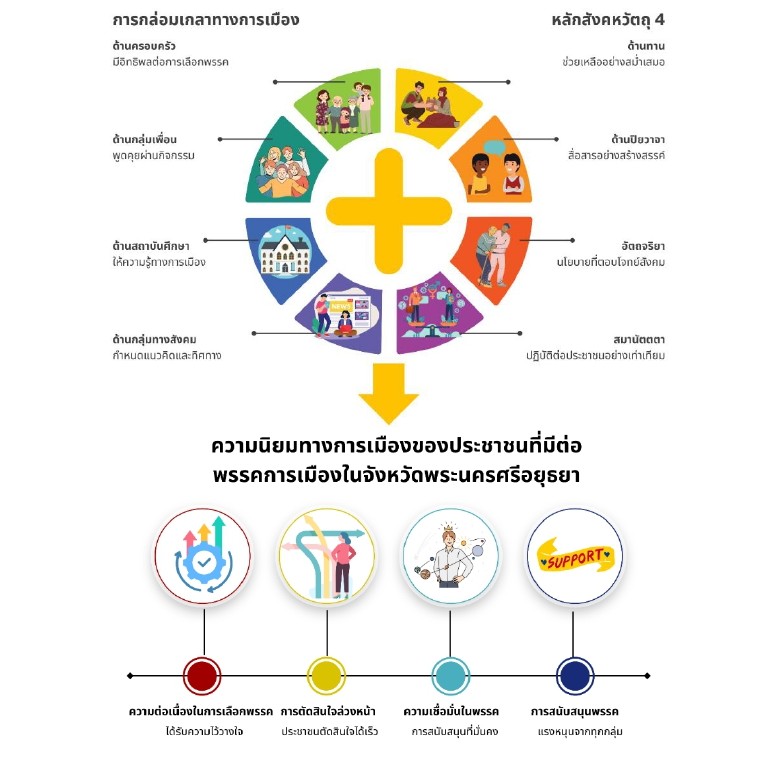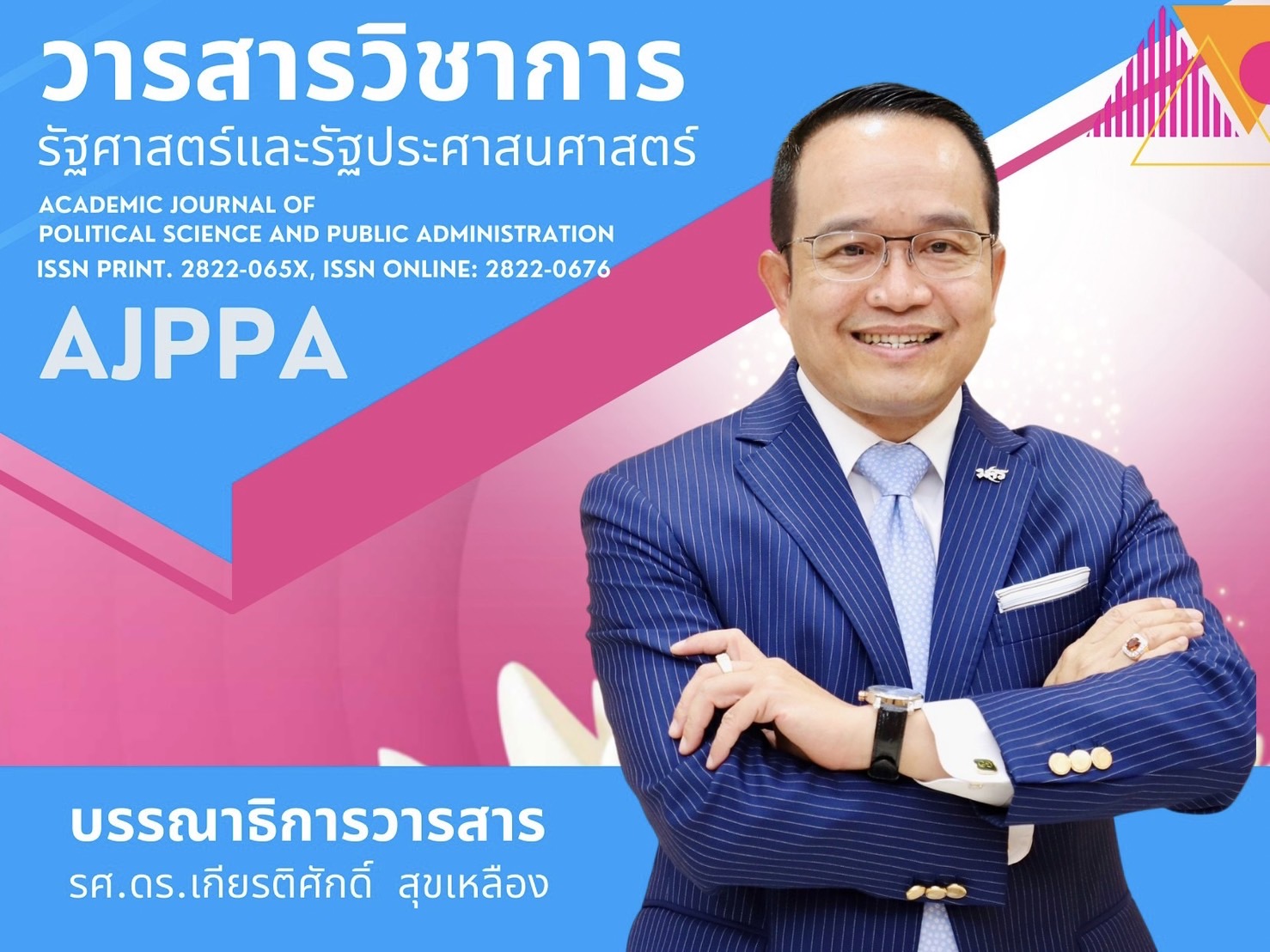การบูรณาการหลักพุทธธรรมเพื่อส่งเสริมความนิยมทางการเมืองของประชาชนที่มีต่อพรรคการเมืองในจังหวัดพระนครศรีอยุธยา
คำสำคัญ:
ประชาชนผู้มีสิทธิเลือกตั้ง, พรรคการเมืองในจังหวัดพระนครศรีอยุธยา, ปัจจัยที่มีอิทธิพล, หลักสังคหวัตถุ 4, การเมืองแบบมีส่วนร่วมบทคัดย่อ
บทความวิจัยนี้มีวัตถุประสงค์ 1. ศึกษาระดับความนิยมทางการเมืองของประชาชนในจังหวัดพระนครศรีอยุธยา 2. ปัจจัยที่ส่งผลต่อความนิยมทางการเมือง และ 3. นำเสนอการบูรณาการหลักพุทธธรรมเพื่อส่งเสริมความนิยมทางการเมืองของประชาชนมีต่อพรรคการเมืองในจังหวัดพระนครศรีอยุธยา โดยใช้ระเบียบวิจัยแบบผสานวิธี ทั้งเชิงคุณภาพและเชิงปริมาณ การวิจัยเชิงคุณภาพ ใช้วิธีการสัมภาษณ์เชิงลึกกับผู้ให้ข้อมูลสำคัญที่คัดเลือกแบบเจาะจง จำนวน 18 รูปหรือคน วิเคราะห์ข้อมูลโดยการวิเคราะห์เนื้อหาเชิงพรรณนาและการสนทนากลุ่มเฉพาะ จำนวน 9 รูปหรือคน เพื่อยืนยันองค์ความรู้ และการวิจัยเชิงปริมาณ ใช้แบบสอบถาม เก็บข้อมูลจากกลุ่มตัวอย่าง คือ ประชาชนผู้มีสิทธิออกเสียงเลือกตั้งในจังหวัดพระนครศรีอยุธยา จำนวน 663,550 คน ใช้สูตรการคำนวณของ ทาโร่ ยามาเน่ ทำให้ได้กลุ่มตัวอย่าง จำนวน 400 คน วิเคราะห์ข้อมูลโดยใช้สถิติเชิงพรรณนาและการถดถอยพหุคูณแบบขั้นตอน
ผลการวิจัยพบว่า 1. ความนิยมทางการเมือง พบว่า ประชาชนมีแนวโน้มสนับสนุนพรรคการเมืองที่สามารถตอบสนองความต้องการได้อย่างต่อเนื่อง มีอุดมการณ์และนโยบายที่ชัดเจน โดยพฤติกรรมการเลือกพรรคสะท้อนผ่านความเชื่อมั่นในบทบาทของพรรคในฐานะตัวแทนผลประโยชน์ของสังคม และการมีส่วนร่วมในกิจกรรมของพรรคอย่างสม่ำเสมอ 2. ปัจจัยที่มีอิทธิพล ได้แก่ ด้านกลุ่มเพื่อน ด้านกลุ่มทางสังคม และด้านสถาบันการศึกษา ซึ่งสามารถทำนายแนวโน้มความนิยมทางการเมืองได้ 46.7 ที่ระดับนัยสำคัญทางสถิติ 0.01 ขณะเดียวกัน หลักสังคหวัตถุ 4 ด้านปิยวาจา วจีไพเราะ และด้านอัตถจริยา สงเคราะห์ประชาชน ก็มีผลต่อความนิยมในระดับหนึ่ง คิดเป็น 17.3 และ 3. การบูรณาการหลักพุทธธรรมช่วยเสริมสร้างความนิยมของพรรคที่ยึดมั่นในคุณธรรม ความโปร่งใส และการมีส่วนร่วมของประชาชน การใช้แนวทางนี้จะนำไปสู่การเมืองที่โปร่งใส ยั่งยืน และเป็นธรรม ซึ่งตอบสนองต่อความต้องการของประชาชนได้อย่างแท้จริง
เอกสารอ้างอิง
กรณัฐ ระงับทุกข์. (2564). การพัฒนาความเป็นพลเมืองในระบอบประชาธิปไตยของประชาชน ที่มีผลต่อการเลือกตั้งทั่วไปในกรุงเทพมหานคร (ดุษฎีนิพนธ์ปรัชญาดุษฎีบัณฑิต สาขาวิชารัฐศาสตร์). พระนครศรีอยุธยา: มหาวิทยาลัยมหาจุฬาลงกรณราชวิทยาลัย.
โกวิทย์ พวงงาม. (2553). การจัดการตนเองของชุมชนและท้องถิ่น. กรุงเทพฯ: บพิธการพิมพ์.
ประคอง มาโต. (2564). การส่งเสริมความนิยมทางการเมืองของประชาชนที่มีต่อนักการเมืองในจังหวัดอุทัยธานี (ดุษฎีนิพนธ์ปรัชญาดุษฎีบัณฑิต สาขาวิชารัฐศาสตร์). พระนครศรีอยุธยา: มหาวิทยาลัยมหาจุฬาลงกรณราชวิทยาลัย.
ภัคสิริ แอนิหน. (2566). การพัฒนาความไว้วางใจทางการเมืองของประชาชนที่มีต่อสมาชิกสภาผู้แทนราษฎรในจังหวัดสมุทรสาคร (ดุษฎีนิพนธ์ปรัชญาดุษฎีบัณฑิต สาขาวิชารัฐศาสตร์). พระนครศรีอยุธยา: มหาวิทยาลัยมหาจุฬาลงกรณราชวิทยาลัย.
ศักดา พลเข้ม และคณะ. (2564). ประชาชนกับการมีส่วนร่วมต่อการเมืองการปกครองในท้องถิ่น. วารสารวิจยวิชาการ, 4(2) 269-282.
สำนักงานประชาสัมพันธ์จังหวัดพระนครศรีอยุธยา. (2566). การเลือกตั้ง ส.ส. 66 จังหวัดพระนครศรีอยุธยา 14 พฤษภาคม 2566. สืบค้น 1 มกราคม 2566, จาก https://shorturl.asia/aR0OV
เสถียร เชยประทับ. (2554). การสื่อสารและการตลาดการเมือง. กรุงเทพฯ: สำนักพิมพ์จุฬาลงกรณ์มหาวิทยาลัย.
อนุชา พละกุล. (2565). การบูรณาการหลักธรรมาธิปไตยเพื่อส่งเสริมการตื่นตัวทางการเมืองในระบอบประชาธิปไตยของเยาวชน จังหวัดเพชรบุรี (ดุษฎีนิพนธ์ปรัชญาดุษฎีบัณฑิต สาขาวิชารัฐศาสตร์). พระนครศรีอยุธยา: มหาวิทยาลัยมหาจุฬาลงกรณราชวิทยาลัย.
อภิรดี โกเฮง. (2566). การประยุกต์หลักพุทธธรรมเพื่อสร้างความนิยมทางการเมือง ของพรรคเพื่อไทยในกรุงเทพมหานคร (ดุษฎีนิพนธ์ปรัชญาดุษฎีบัณฑิต สาขาวิชารัฐศาสตร์). พระนครศรีอยุธยา: มหาวิทยาลัยมหาจุฬาลงกรณราชวิทยาลัย.
Likert, R. (1967). The Method of Constructing and Attitude Scale. New York: Wiley & Son.
Yamane, T. (1973). Statistics: An Introductory Analysis. (3rd Ed). NewYork: Harper and Row Publications.

ดาวน์โหลด
เผยแพร่แล้ว
รูปแบบการอ้างอิง
ฉบับ
ประเภทบทความ
หมวดหมู่
สัญญาอนุญาต
ลิขสิทธิ์ (c) 2025 วารสารวิชาการรัฐศาสตร์และรัฐประศาสนศาสตร์

อนุญาตภายใต้เงื่อนไข Creative Commons Attribution-NonCommercial-NoDerivatives 4.0 International License.




